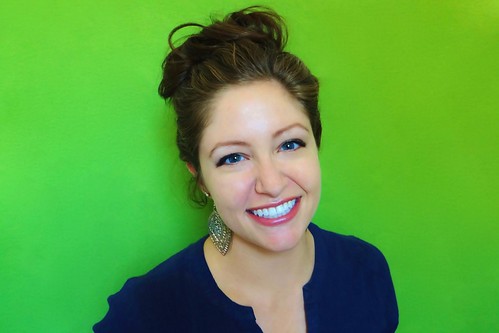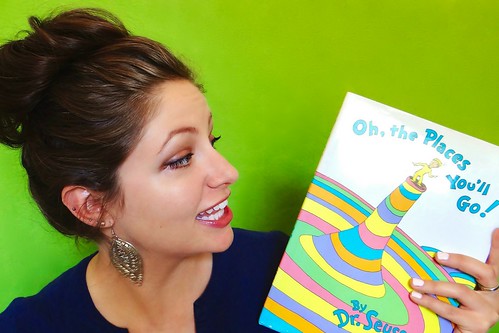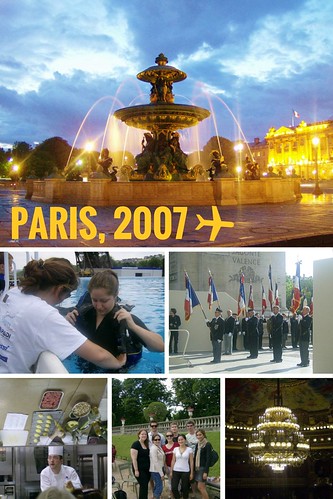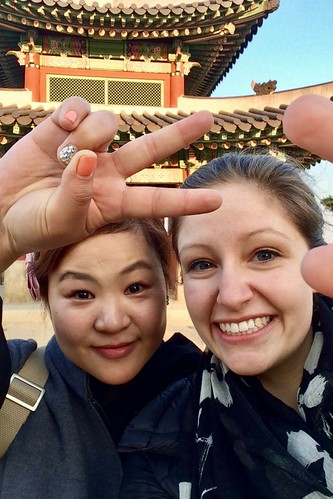Becca Leigh La Creta loved studying abroad so much that she made it her career. She started in the Dominican Republic, continued her journey through Paris, and then moved to Korea to teach English before pursuing her master’s in international education. Her biggest regret? Not studying abroad for a whole semester during undergrad; now, she wants all students to know why studying abroad is the greatest thing on the planet - and accessible to all - by writing at www.studyabroadandbeyond.com… and by being a study abroad advisor IRL.

What motivated your decision to go abroad? How/why did you choose where to go?
Whoever gave me the book “Oh, the Places You’ll Go!” when I was three destined me for life. I took that book very seriously, and still do to this day.
My first time abroad was when I was seven; I remember walking along the Seine and telling my parents that I was going to come study at the Sorbonne when I was older. I’m pretty sure they took that statement as seriously as my promise to be president (#2050). While I didn’t end up studying at the Sorbonne, I did study in the same quarter in Paris (close enough!).
At the time, I was an English and French double major with a focus in education as well as two minors in History and International Relations and loved the idea of studying abroad, but really was cramped for time (when trying to graduate in four years). For that reason, I focused on summer programs relevant to my studies, which led me to both the Dominican Republic (community education-focused program) and France (knock out some of those French credits).

What was your experience like? What is your favorite memory? What were some challenges you observed?
While in Paris, I treasured the opportunity to meet my classmates in the French classes. I developed friendships with students from Australia, Colombia, England, Bolivia, Mexico, Germany, and other countries - and our common language was French. It was hilarious to understand a second language across accents, and it gave me a much greater appreciation for language-learners as a whole.
My favorite memory was Paris itself. Many of the students who were on the program with me spent weekends traveling across Europe, to other areas of France, and harnessing the “typical” study abroad experience.
I wanted to fall in love with the city.
By staying in the city for the duration of the program, I was afforded many more opportunities than I could imagine; I:
- Got to know my classmates out of class; we all explored the many Parisien gardens together and had lazy picnics whilst studying.
- Honored the Unknown Soldier at the Arc de Triomphe with a different group of veterans at 6:30pm on many days.
- Went scuba diving under the Eiffel Tower… twice. For free. To spread awareness of the importance of preserving our reefs.
- Enrolled in a cooking class at Le Cordon Bleu.
- Visited every arrondisement before “Paris, je t’aime” made that cool.
- Spent an entire day wandering Pere Lachaise cemetery, seeing the graves of artists from days gone by.
- Enjoyed a show at the Opera Garnier, while checking for the Phantom of the Opera (of course).
It’s hard to pinpoint one memory that is my favorite, because they all rolled into a life-changing experience.
My biggest challenge while studying abroad, however, was opening myself up to different ways of thinking. In the United States, we are taught that there are seven continents. It’s something that is a fact… to us. However, on my first day of language class, we divided ourselves up by continents, and my French teacher lambasted me (ever so eloquently) for not standing with the girls from Colombia.
It turns out that she (and some other people) view America as one continent, not two separate ones.
I was STUNNED.
That feeling of shock, and subsequent frustration, has influenced my conversations and teachings of intercultural communication. It also prepared me for teaching in South Korea, where I had the opportunity to experience far more differences in culture. It builds character at least!

What skills did you develop from your experience? Do you feel changed from your experience abroad?
I like to tell students that, once you study abroad, you never go back to how you were before.
A version of you goes out, and an upgraded version comes back. And future you will love the decision you made to study abroad.
Studying abroad was impactful, but moving abroad for a longer period of time definitely had a more profound impact on my life. I learned resiliency, how to navigate conversations with people who have a different cultural context, and how to be alone. I learned humility, and how deep culture infiltrates how we all see and understand the world. I learned how to “adult,” especially because of the many time zones between me and my family.
For a very specific example of how I changed, I was most surprised about how my view of cleanliness changed while living alone in Korea. I had always been a mostly messy college student - my clothes rarely made it anywhere but the floor. It took two months of living in my own nest of clothes before one unfortunate evening of an upset stomach led to a permanent change - all things must be put away before I go to bed in order for me to be happy. Thanks, study abroad!

Has your experience helped you get to where you are today?
I loved study abroad so much that it became my career!
The growth I experienced as an individual was incredible, and I’m dedicated to helping students now and in the future to identify positive experiences for them to explore their world. I’m especially passionate about spreading the word about scholarships and other opportunities for living abroad; everyone should be able to have the option to study abroad, regardless of financial background.
On any given day, I continue to tell anyone about how to afford study abroad - recently, it was a college counselor at a low-income high school. I met him on the train on my way to work, and made sure to tell him about the Gilman Scholarship!
What advice would you share with other students who are thinking of going abroad?
This is hard to pick just one thing - I have an entire blog dedicated to advice for study abroad students!
The biggest thing I have to say is that it is completely possible to have the experience that you want - it just takes a lot of planning and managing expectations.
Study abroad doesn’t have to break the bank, but it is important to broaden the horizons of where you choose to go based on the reality of your situation. If you are concerned about finances, look for more affordable destinations (hint - places that are non-traditional!). If you have severe food allergies, make sure you know how to navigate that in the host culture. Just do as much research as possible and focus on how it can be your experience - don’t get distracted by just your friends’ pictures!
Finally, the longer you can study abroad, the better.
How has international education impacted or influenced your cultural identity?
It absolutely has. Living and studying abroad allowed me to take a harder look at why I do things the way I do.
While I am culturally comfortable living in urban areas on the East Coast of the United States, I don’t have the opportunity to grow as a person unless my ideas and culture are challenged; working with international students helps that on a daily basis. Whenever I encounter a situation that makes me uncomfortable, I root it in a difference in culture and explore why I was uncomfortable (later… and sometimes months later). I’m always learning more about my own culture and cultural identity, and I’ve even experienced some cultural envy. It’s exciting to keep learning.
Is there anything else you'd like to share with us?
Go early, go often, go for as long as you can, and go with an open heart and mind.
#StudyAbroadBecause Future You Will Love You. It’s one of the best investments you can make in yourself.
Pin for later:

All photos courtesy and copyright Becca Leigh La Creta
